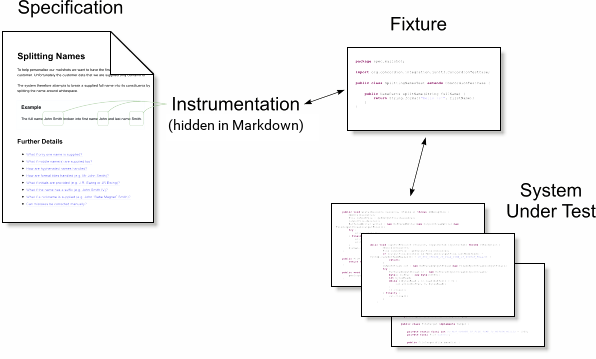clj-concordion
Add support for Clojure and clojure.test to Concordion,
a Specification By Example tool.
With Concordion, you can write high-level specification of features in Markdown and document them with examples. Hidden instrumentation (in the form of magic links) binds the examples to functions in your Fixture classes making it possible to verify them against the code. When you run your test runner, Concordion does generate HTML files incorporating results of the passed or failed examples/tests.

Usage
Preparation
Add a dependency on this project (copy the latest dependency specification for Lein/Boot/deps.edn/Gradle/Maven from Clojars):
(Depending on your build tool, you might also need to add an explicit dependency on org.concordion/concordion, see our project.clj.)
Coding
Given the Concordion specification <class path>/math/Addition.md containing:
Adding [1](- "#n1") and [3](- "#n2") yields [4](- "?=add(#n1, #n2)").
you need to implement the function in a test namespace of a matching name (plus -test) and define the fixture for it:
(ns math-test
(:require
[clojure.test :refer :all]
[clj-concordion.core :as cc]))
; The arguments are always Strings
(defn add [n1 n2]
(int (+ (Integer/parseInt n1) (Integer/parseInt n2))))
;; Create the fixture class and clojure.test test.
;; Notice that the name of the ns and fixture corresponds to the path to the specification
;; .md (excluding the "-test" suffix of the ns)
(cc/deffixture Addition)
;; Ensure Concordion is reset between each run (when running repeatedly via REPL)
(use-fixtures :once cc/cljtest-reset-concordion)
And run it:
$ lein with-profile auto test
lein test math-test
file:///var/folders/kg/r_8ytg7x521cvlmz_47t2rgc0000gn/T/concordion/math/Addition.html
Successes: 1, Failures: 0
Ran 1 tests containing 0 assertions.
0 failures, 0 errors.
Deviation from Concordion
- See "Valid expressions in specification files" below
- The option
declaresFullOGNLis not supported because we have our own evaluator.
Valid expressions in specification files
We use our own expression evaluator instead of Concordion's OGNL one, which has some consequences, both positive and negative.
The expressions are a subset & superset of EDN and thus:
- Constants are supported. Ex.:
[ ](- "myFn(#var1, 'literal string', 123)") - Keywords are allowed:
"doSomething(:action 'fire!')" - Commas are optional
- Spaces between elements may be necessary (since
=is a valid part of name in Clojure but in an expression we most likely want to break around it) - Special handling of
'and#: all'are replaced with"and all#are removed. This can conflict with test values that contain them - report an issue if it happens.
See the Expression specification for details.
Options
Notice that deffixture takes a second, optional parameter, a map of options - see the :cc/opts Clojure spec for valid keys and
FixtureDeclarations,
ConcordionOptions,
Concordion docs and below for their meaning.
clj-concordion specific options
:cc/no-asserts?- iftruedo not log a warning when the specification has no asserts (i.e.?=...,c:assertTrue=...etc).:cc/no-trim?- iftruedo nottrimvariable values (which we do because Concordion includes an extraneous whitespace in table-initialized variables):cc/(before|after)-*- see below
Setup & tear-down functions
The opts argument to deffixture can also contain setup/tear-down functions run at different points of the lifecycle:
(cc/deffixture Addition
{:cc/before-suite #(println "AdditionFixture: I run before each Suite")
:cc/before-spec #(println "AdditionFixture: I run before each Spec")
:cc/before-example (fn [exname] (println "AdditionFixture: I run before example" exname))
:cc/after-example (fn [exname] (println "AdditionFixture: I run after example" exname))
:cc/after-spec #(println "AdditionFixture: I run after each Spec")
:cc/after-suite #(println "AdditionFixture: I run after each Suite")})
REPL development
To be able to run tests repeatedly from the REPL, you need to reset the previously cached results:
(do
(cc/reset-concordion!)
(run-tests))
Additional resources
Troubleshooting
General
When troubleshooting, enable debug logging for
namespaces clj-concordion.*.
Common problems
Warning: The specification with the fixture seems to have no asserts
This warning is logged when the result from Concordion has zero all of the success, failure, and exception counts.
It is OK to ignore if your .md file has indeed no asserts and you can disable it by setting the options
{:cc/no-asserts? true} on the deffixture. But if the spec has asserts and you expected to see some results then
something went wrong. Enable debug logging as described above, check carefully the output (also the terminal if you connect to a remote REPL),
try to debug to find out what is Concordion doing.
Status
Alpha. Core features supported but there are certainly many rough corners and lurking bugs.
Limitations
Changelog
TODO
- Re-run tests also when the .md files changes - add the resources/ to the watch path
Implementation
NOTE: Concordion normally uses OGNL to map function calls and property access in the specification to the fixture class. We replace it with our own evaulator so that we don't need to generate classes from Clojure.
How is a specification test invoked:
There's 2 places where the test runner is called:
Directly when invoking a test - eg. the JUnit4 ConcordionRunner, the JUnit3 ConcordionTestCase. These call FixtureRunner which calls ConcordionBuilder. You're likely to want to create something similar to ConcordionTestCase and FixtureRunner, then reuse ConcordionBuilder - eg, see Mark Derricutt's basic TestNG runner. This was created way back for Concordion 1.3.1 - you'll need to implement the Fixture and FixtureDeclarations interfaces from Concordion 2.0.0 onwards.
Indirectly, from a Concordion Suite, when the concordion:run command is encountered in a specification, spawning a new test within a test. If you want to support the concordion:run command, this is where the Runner / DefaultConcordionRunner comes in. By default ConcordionBuilder plugs in a SystemPropertiesRunnerFactory which lets you override the Runner with a system property. If this doesn't suit, we could open up withRunnerFactory as an extension method - rather than overriding RunStrategy which is designed to cater for different strategies for invoking the Runner.
Development
Testing
lein with-profile test auto test
Deployment
# Ensure credentials unlocked
gpg --quiet --batch --decrypt ~/.lein/credentials.clj.gpg
# Deploy
lein deploy clojars
# Likely: tag, change version to <next>-SNAPSHOT
git tag <version>; git push; git push --tags
License
Can you improve this documentation?Edit on GitHub
cljdoc is a website building & hosting documentation for Clojure/Script libraries
× close